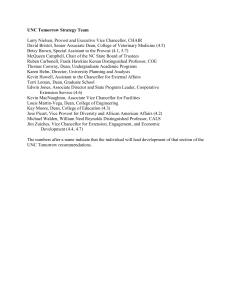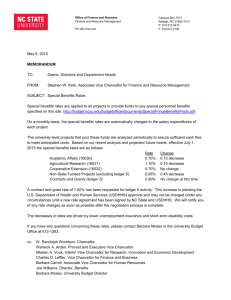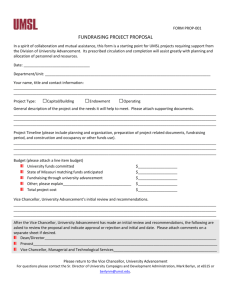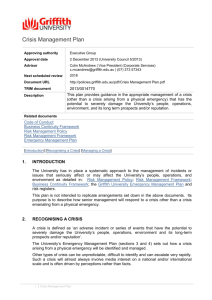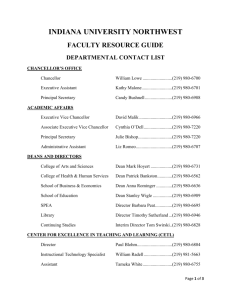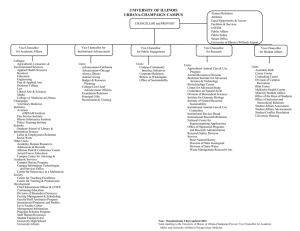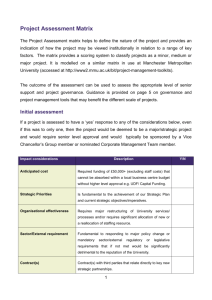Executive Assistant
advertisement
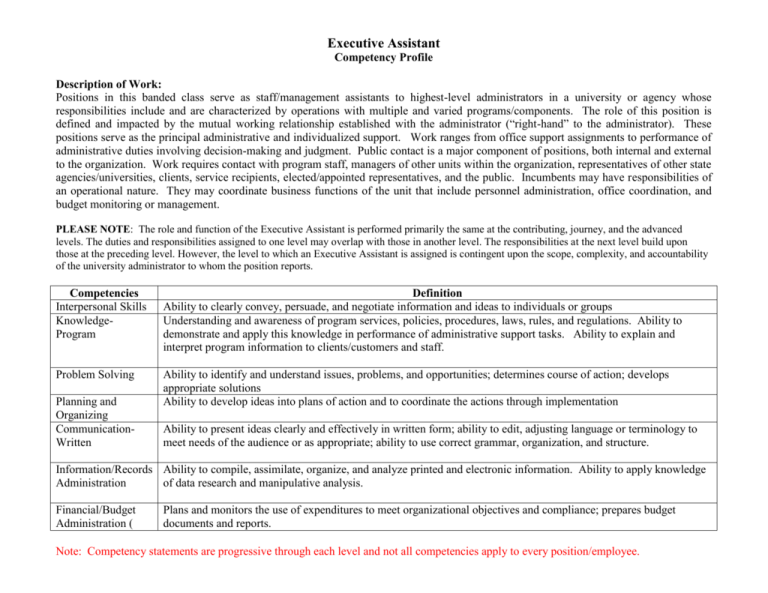
Executive Assistant Competency Profile Description of Work: Positions in this banded class serve as staff/management assistants to highest-level administrators in a university or agency whose responsibilities include and are characterized by operations with multiple and varied programs/components. The role of this position is defined and impacted by the mutual working relationship established with the administrator (“right-hand” to the administrator). These positions serve as the principal administrative and individualized support. Work ranges from office support assignments to performance of administrative duties involving decision-making and judgment. Public contact is a major component of positions, both internal and external to the organization. Work requires contact with program staff, managers of other units within the organization, representatives of other state agencies/universities, clients, service recipients, elected/appointed representatives, and the public. Incumbents may have responsibilities of an operational nature. They may coordinate business functions of the unit that include personnel administration, office coordination, and budget monitoring or management. PLEASE NOTE: The role and function of the Executive Assistant is performed primarily the same at the contributing, journey, and the advanced levels. The duties and responsibilities assigned to one level may overlap with those in another level. The responsibilities at the next level build upon those at the preceding level. However, the level to which an Executive Assistant is assigned is contingent upon the scope, complexity, and accountability of the university administrator to whom the position reports. Competencies Interpersonal Skills KnowledgeProgram Definition Ability to clearly convey, persuade, and negotiate information and ideas to individuals or groups Understanding and awareness of program services, policies, procedures, laws, rules, and regulations. Ability to demonstrate and apply this knowledge in performance of administrative support tasks. Ability to explain and interpret program information to clients/customers and staff. Problem Solving Ability to identify and understand issues, problems, and opportunities; determines course of action; develops appropriate solutions Ability to develop ideas into plans of action and to coordinate the actions through implementation Planning and Organizing CommunicationWritten Ability to present ideas clearly and effectively in written form; ability to edit, adjusting language or terminology to meet needs of the audience or as appropriate; ability to use correct grammar, organization, and structure. Information/Records Ability to compile, assimilate, organize, and analyze printed and electronic information. Ability to apply knowledge Administration of data research and manipulative analysis. Financial/Budget Administration ( Plans and monitors the use of expenditures to meet organizational objectives and compliance; prepares budget documents and reports. Note: Competency statements are progressive through each level and not all competencies apply to every position/employee. Competency Interpersonal Skills Contributing Manages access to administrator by screening calls and visitors to determine appropriate course of action. Serves as a liaison between administrator, reporting units and constituencies for the purpose of relaying instructions and information and following commitments through to completion. Interacts and communicates using judgment and discretion. Prioritizes organizational needs regarding meetings, timeframes, and deadlines. Exercises delegated authority to speak on behalf of the administrator regarding a variety of administrative and programmatic matters. May attend meetings in administrator’s absence to obtain information. Journey Serves as a liaison between the Assistant/Associate Vice Chancellor or Vice Provost and reporting units, constituencies, and external contacts, for the purpose of interpreting instructions and information and following commitments through to completion. Interacts and communicates with a strong degree of judgment and discretion. Prioritizes and negotiates organizational needs regarding meetings, timeframes, and deadlines. Exercises delegated authority to speak on behalf of the Assistant/Associate Vice Chancellor or Vice Provost regarding a variety of sensitive administrative and programmatic matters. Advanced Persuades, prioritizes and negotiates, on behalf of the Vice Chancellor or Chancellor, to build cooperation and consensus with a variety of internal and external contacts and groups. Represents the administrator on a variety of subjects; serves on various committees; and may attend meetings in Vice Chancellor or Chancellor’s absence to provide substantive input. KnowledgeProgram Demonstrates knowledge of the programs, operational structure, and administrator’s scope of responsibilities. Work requires an awareness of specific functions and staff assignments within the organization’s reporting units and constituencies. Demonstrates working knowledge of policies, procedures, and processes required within the organization. Demonstrates and applies knowledge of rules, regulations, and laws affecting organization. Applies knowledge of strategic goals, Demonstrates thorough knowledge of the programs, operational structure, and administrator’s scope of responsibilities, priorities, and commitments of the Assistant/Associate Vice Chancellor or Vice Provost and subordinate units. Demonstrates considerable knowledge of a variety of programs, the total scope of the Assistant/Associate Vice Chancellor or Vice Provost’s responsibility, and the composite culture of the organization. Applies substantive knowledge in order to assist and represent the Vice Chancellor or Chancellor thoroughly in the scope, diversity, and complexity of all program operations and organizational commitments. Demonstrates and applies the knowledge of the nuances, appropriate protocol, culture and environment of the Vice Chancellor or Chancellor and constituents. organizational practices, and critical polices, laws, rules, and regulations that impact the mission of the organization and its programs. Work requires a thorough understanding of internal and external constituents and organizations with which the administrator’s commitments must be coordinated. Problem Solving Planning and Organizing Identifies and resolves problems that would not require administrator’s direct involvement. Problems are addressed in accordance with priorities, policies, commitments, and program goals of the administrator. Exercises independent judgment and understands the impact of the decisions on the administrators’ role and commitments. Researches and develops solutions for unusual and novel situations. Establishes priorities in response to work flow of the administrator. Coordinates and directs the office support activities and facilitates workflow for the administrator and subordinate units. Tracks and monitors pending issues for follow-up and independently develops agenda for future meetings. Maintains administrator’s calendar, schedules appointments without prior approval based on knowledge of administrator’s responsibilities and issues of importance. Locates and assembles information for various reports, briefings, and conferences. Makes travel arrangements. Plans and organizes conferences, retreats, and/or events for administrator. Analyzes and resolves unusual and novel situations based on significant knowledge of the Assistant/Associate Vice Chancellor’s or Vice Provost’s priorities and delegated authority. Ability to coordinate, facilitate and implement solutions with internal and external organizations and constituents. Anticipates potential problems that could impact the Vice Chancellor or Chancellor and the scope of internal and external responsibilities/activities. Develops and negotiates solutions. Routinely coordinates and facilitates solutions with internal and external organizations and constituents. Attends meetings of the Assistant/Associate Vice Chancellor or Vice Provost to stay abreast of and prioritize issues. Researches and monitors pending issues for followup and develops agenda for future meetings. Organizes and reviews documents for university boards, hearings, and/or commission meetings. Plans work activities to meet established objectives. Establishes deadlines and priorities to facilitate completion of work assignments. Anticipates and resolves conflicts, competing with Assistant/Associate Vice Chancellor’s or Vice Provost’s schedule and/or priorities. Assesses the needs of the organization and recommends or makes minor changes in workflow, procedures, or assignments to accommodate changing priorities. Researches information to plan and coordinate special projects. Considers the Vice Chancellor’s or Chancellor’s vision, mission, and values in making decisions and taking actions that affect the organization. Identifies and considers possible alternatives related to the coordination of special projects or to meet organizational objectives. Reports on progress of organization’s key initiatives and bases follow-up on achieving desired outcomes pursuant to the organizational business plan or management goals. CommunicationWritten Researches, develops and drafts letters, memos, or reports to communicate the administrator’s decisions, ideas, and agenda. Edit documents to incorporate information and ideas specific to the administrator and/or the programmatic activities within the overall organizational unit or division. Information/Records Manages and monitors a variety of Administration information impacting the administrator’s responsibilities. Researches information to support conclusions and recommendations. Interprets and summarizes information based on program knowledge, organizational goals, and priorities. Establishes and maintains paper and electronic files and records for the administrator. Financial Monitors and reconciles the Administration administrator’s operational budget or (Budget) a component of the overall budget or program budget which includes tracking expenditures and making recommendations regarding the use and distribution of funds. May require independent decision-making to revise budget line items. Independently integrates information, composes materials, and scripts a variety of written communications for use by the Assistant/Associate Vice Chancellor or Vice Provost (e.g. publications, web site, etc.). Independently researches information affecting organizational goals and objectives. Provides preliminary analysis, summaries, and recommendations to the Assistant/Associate Vice Chancellor or Vice Provost to support decisionmaking. Manages or oversees the overall budget for the Assistant/Associate Vice Chancellor or Vice Provost by coordinating budgetary affairs with unit or departmental or unit heads. Performs this responsibility from a long-range planning perspective and based on knowledge of broad organizational objectives and strategic goals. Independently researches, develops, and composes presentation materials and scripts for use by the Vice Chancellor or Chancellor in a variety of settings. Anticipates Vice Chancellor’s or Chancellor’s needs to develop written communication. Edits documents developed from external sources to incorporate the Vice Chancellor’s or Chancellor’s personal style. On behalf of the Vice Chancellor or Chancellor, independently researches, analyzes, and makes decisions regarding a variety of information from internal and external sources. In conjunction with the Vice Chancellor or Chancellor, advises and reports on fiscal matters such as budget planning, budget analysis, and funding sources as they impact the entire organizational unit over which the Vice Chancellor or Chancellor has responsibility. Oversees and/or serves as a resource for subordinate units. May supervise accounting personnel. MINIMUM TRAINING AND EXPERIENCE: Graduation from high school and three years of progressively responsible administrative/office management experience; or graduation of a two-year secretarial science or business administration program and one year of experience as described above; or graduation from a fouryear college or university, preferably with major emphasis on Business administration or a related field; or an equivalent combination of training and experience. Degrees must be received from appropriately accredited institutions. Special Note: This is a generalized representation of positions in this class and is not intended to reflect essential functions per ADA. Examples of competencies are typical of the majority of positions, but may not be applicable to all positions. Rev. 7/09
